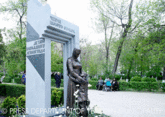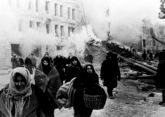The topic of the siege of Leningrad is not widely covered in the world media, especially when compared with the Holocaust, an analyst of Vestnik Kavkaza, Artyom Sokolov said in the National Question program on Vesti.FM.
"Silke Bigalke’s article in the German newspaper Süddeutsche Zeitung published in January 2019, on the eve of the military parade in St. Petersburg in honour of the 75th anniversary of the lifting the siege, caused a great resonance. In an article entitled ” Moscow is abusing the memory of Leningrad,” Bigalke presents Russia as a party that is diminishing the significance of the tragedy. "Once again, those in power in Moscow are demonstrating soldiers instead of showing sympathy, and emphasizing national pride rather than memory”, the expert cites the article.
“At the same time, she admits that the blockade was a genocide organized by the Wehrmacht, as a result of which over a million people died. The blockade was genocide. But after the war, neither side was interested to call it genocide,” the German journalist wrote, the analyst reminds.
“In her opinion, it’s not worth remembering the event every year. The journalist calls the blockade ”one of the most monstrous crimes of the Wehrmacht,” which was not discussed in Germany for a long time. The idea of people as victims who gave their lives for the victory of Russia seems to be dangerous. "As if this would justify their death as if they were dying of hunger voluntarily. This belittles what happened, and it is dangerous,” Bigalke concludes. The article of the German journalist caused a wide public outcry. The State Duma, the Federation Council, the Society of residents of besieged Leningrad, the Russian Union of Veterans - all responded to the article,” Artem Sokolov stressed.
But generally speaking, in the German press, as a rule, materials on the siege of Leningrad are reduced to either an ordinary excursus into history or to a review of a book devoted to this issue, the analyst of Vestnik Kavkaza noted.
”About five years ago, the MDR website published an article entitled ”Destruction by hunger - the Leningrad blockade.” In it, the author tells that the blockade was Hitler's personal order. Initially, it was planned to take the city, but then it was decided to siege it. The article emphasizes that what Nazi propaganda was selling as a preventive war against Bolshevism turned out to be a war of racial extermination. The author also calls the siege of Leningrad one of the most egregious war crimes during World War II,” the expert noted.
"In 2019, the German newspaper Die Welt published an article with the quotes from Ales Adamovich and Daniil Granin’s The Blockade Book. ”In fact, it is a review of the book which contains 200 stories of the blockade recorded. The total volume of the material amounted to 4,000 pages. The author of the article also admits that the siege of Leningrad was a heinous crime for which the Wehrmacht is responsible,” Artem Sokolov concluded.










